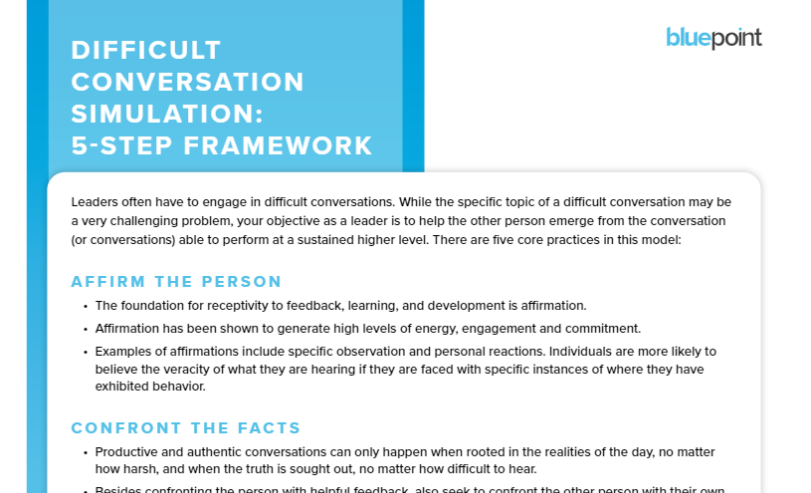When we think of difficult conversations, we often think about giving constructive feedback to someone. However, difficult conversations come in all shapes and sizes. A difficult conversation is any conversation where the emotional outcome is unknown and uncertain: apologizing to a coworker about how you spoke to them, delivering tough news up or across the organization, firing or laying off someone, announcing budget cuts, or speaking up in a meeting when you would prefer to remain quiet. All these conversations can create a negative emotional reaction, so we may desire to avoid them altogether. However, as leaders, these are the types of conversations that build trust, shape our values, and reveal our character.
Difficult conversations require us to harness courage. These conversations open us up to emotional exposure, which can often lead to us getting hurt—meaning we must be courageous. To be courageous is to take a step of faith in uncertain circumstances. Remember, courage isn’t the absence of fear. It is acting in the face of fear.
When you are about to engage in a difficult conversation where you will have to muster up the courage, try these three tactics:
Embrace discomfort
We build courage when we are pushed out of our comfort zone. Leaning into uncomfortable conversations helps us grow in our leadership as we master the art of difficult conversations. The next time you face a difficult conversation, prepare the what, why, and how. What is the main topic that needs to be discussed? Why must the conversation happen? How does the topic, situation, or circumstance affect you? Clarifying the situation puts the conversation into perspective and helps you embrace the temporary discomfort, giving you the courage to act.
Check your intentions & serve
Before giving feedback, check your intentions. This idea can be applied to any uncomfortable conversation. Are you delivering this negative information to improve the organization’s financial health? Are you letting an employee go because they are not performing? Further, before beginning the conversation, think about how you can serve the other party. What strategies can you offer management to accompany the bad news? What can you do to help the employee in this difficult transition?
Let go of expectations
Difficult conversations often do not go as expected, and our high expectations for these conversations often result in hurt feelings. Understand that a difficult conversation may not go as you’ve planned, and be prepared to face an emotional response from the other party. Courage is found when facing uncertainty. During your next difficult conversation, use empathetic listening to truly understand the other person. Listen for their fears, listen for their concerns, and listen for what’s not being said.
“Courage is contagious. To scale daring leadership and build courage in teams and organizations, we have to cultivate a culture in which brave work, tough conversations, and whole hearts are the expectation, and armor is not necessary or rewarded.” ––Brené Brown
About The Author

Christina Beaulne
Christina is a Senior Instructional Designer for Bluepoint. She is responsible for creating curriculum to help leaders develop their coaching skills to not only achieve personal and organizational goals, but also to create extraordinary impact in the lives of employees and the community at large.
Related Resources

Beyond the Individual: How Coaching Transforms Teams
leading-teams

7 Leadership Strategies to Combat Change Fatigue
leading-change

Difficult Conversation Simulation: 5-Step Framework
communication
Subscribe to newsletter
Subscribe to our newsletter today and receive innovative, insightful and thought provoking resources (videos, webinars and articles) all effective tools for developing leadership talent.
Connect with Us Today!
This is a gated resource. Contact sales at info@bluepointleadership.com for more information or reach out here: Contact Us
This is a member-only resource. Contact sales at info@bluepointleadership.com for more information.


